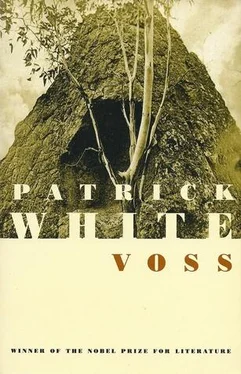For almost all, the situation had begun to assume the terrible relevant irrelevance of some dreams. They stood rooted in the urgent need to find the compass.
Which Judd, it now appeared, was drawing out of his own saddle-bag.
‘But I never put it there,’ said his shocked voice. ‘There was no reason.’
His strong face was weak.
‘No reason,’ he added, ‘that I can think of.’
But he would continue to fossick in desperation through his memories of all evil dreams.
Voss had turned and walked away. The incident was closed, if not to his positive advantage, to the detriment of some human being. Yet, there were times when he did long to love that which he desired to humiliate. He recalled, for instance, the convict’s wife, whose simplicity was subtle enough to survive his proving of her lie. He remembered, with some feeling, the telescope that Judd himself had rigged up, and found unequal to its purpose of exploring the stars. Associated with such thoughts, of human failure and deceit, the German’s shoulders narrowed as he flumped across the dusty yard. Judd’s humiliation over the discovered compass forced him up the side-tracks of pity, until, suddenly, he jibbed. Delusion beckoned. His throne glittered achingly.
Down at the tents, Judd said:
‘Mr Palfreyman, I did not put that compass there.’
‘I believe you,’ answered Palfreyman.
‘There was no reason.’
There is always a reason, Palfreyman corrected silently, and would continue to search for this one.
Their stay at Jildra had become for the ornithologist a season of sleep-walking, dominated by his dream — it could have been — of tortured moonlight and rustling shadow, that retrospect had cast in lead. This brooding statue stumped horribly for him under the glass moon, but although Palfreyman watched — in fact, he continued to do so long after they had moved on — Voss the man did not walk again.
And now, at Jildra, something else was about to happen. Blacks scented it first upon the evening air, and dogs were half inclined to snarl, half to fool with one another. Then some of the white men, who had washed their necks and faces of dust, and who were smelling of dried water and soap, and an aggressive, crude cleanliness, came up formally from the tents to announce that a team was approaching. Distantly already the barking of strange dogs was going off like pop-guns, and the dogs of Jildra had begun to whine and to bite at one another’s shoulders, to express their joy and solidarity.
‘It is Thorndike, then,’ said Voss, running out without a hat, which left the white of his forehead exposed: he could have been emerging from a mask.
‘Damn me, if you were not right,’ contributed Boyle.
The latter was now permanently good-tempered, indifferent, acceptant, and, above all, amused.
In time the team was straining into Jildra, with that gallantry of animals reaching a goal. The bullocks groaned to a stop, and were turning up their eyes, dilating their nostrils, and, to the last, resisting the heavy yokes with their necks.
Thorndike, a scrawny, bloodshot individual, did not make any great show of pleasure, so insignificant and regular were his habits. Nor did he pay much attention to the German, about whom people had been talking; he merely handed over, as he had undertaken. For Thorndike brought, in addition to the expected provisions for Jildra, an axe that had been left behind at the station of a Mr McKenzie with whom the expedition had camped some miles farther back, as well as a bundle of mail, tied with a bow of string, for the German cove.
Voss took the mail, and was striking his leg with it as he asked Thorndike questions, flat ones about his journey and the weather, at which the other rasped back in some amusement. Thorndike had never seen a German, but was determined not to look at this one. So he spat, and worked his adam’s apple, and went about freeing his bullocks.
Presently, Voss went inside and untied his letters.
There were instructions and digressions, naturally, by Mr Bonner. There was a friendly line from Sanderson; newspapers; and a lady had contributed a fly-veil, made by her own hands, out of knotted, green silk.
There was also the letter, it would appear, from Miss Trevelyan.
When he had read or examined all else, throwing pieces of intelligence to his host, who had by this time pushed back his plate, and was picking his teeth and mastering his wind, Voss did break the seal of Miss Trevelyan’s letter, and was hunching himself, and spreading and smoothing the paper, as if it had been so crumpled, he must induce it physically to deliver up its text.
Finally he read:
Potts Point,
— Nov., 1845
Dear Mr Voss,
I must hasten to thank you for your letter, which arrived at its destination several days ago, by Newcastle packet. If the length of time needed for mine to reach you should make you suspect an utter unwillingness on my part to reply, you must take into account great and exonerating distances, as well as the fact that I have been compelled by the substance of what you have written to give it the deepest possible consideration. Even after such thought, I confess it is not clear what answer one in my position would be expected to return, and, since it is one of my most stubborn weaknesses to try to reach conclusions without the benefit of advice, I must, I fear, remain at least temporarily confused.
Your letter was unexpected, to say the least of it: that anybody possessed of your contempt for human frailty should make so unequivocal a proposition to one so well endowed with that same frailty! For, on at least one memorable occasion, you did not attempt to conceal your opinion that I was a person quite pitiably weak in character. Having formed a similar estimate of myself, I could not very well reject your judgement, even though the truth one has perceived is, if anything, more distasteful when confirmed by the mind of another, a mind, moreover, that one has held in some esteem. That you made me suffer, I cannot deny, but the outcome or purpose of that suffering still remains to be understood. In the meantime, if nothing else, my lamentable frailty does accuse my arrogance.
Arrogance is surely the quality that caused us to recognize each other. Nobody within memory, I have realized since, dared so much as to disturb my pride, except in puppyish ways. Men, I am inclined to think, are frightened if their self-importance does not impress. You, at least, were not frightened, but ignored me so coldly that I was the one to become alarmed — of my insignificance and isolation.
So, Mr Voss, we have reached a stage where I am called upon to consider my destroyer as my saviour! I must take on trust those tender feelings you profess, and which I cannot trace clearly through the labyrinth of our relationship. Can you wonder that I am confused? All the more since I have remained almost morbidly sensitive to the welfare of one whose virtues do not outweigh the many faults I have continued to despise .
Now the question is: can two such faulty beings endure to face each other, almost as in a looking-glass? Have you foreseen the possible outcome? And have you not, perhaps, mistaken a critical monster for a compliant mouse?
I, personally, to assume a most unseemly candour, would be prepared to wrestle with our mutual hatefulness, but mutually, let it be understood. For I do respect some odd streak of humanity that will appear in you in spite of all your efforts (after reading poetry, for instance, or listening to music, while your eyes are still closed), just as I regret most humbly my own wretched failures to conquer my unworthiness.
Only on this level, let it be understood, that we may pray together for salvation, shall you ask my Uncle to accept your intentions, that is, if you still intend.
Читать дальше












